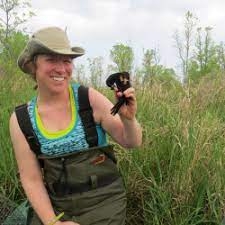PhD defense: Laura Schoenle- The role of glucocorticoid hormones in coping with chronic infection
May 29, 2017

IGC Fellow, Laura Schoenle, gave her Ph.D. defense seminar on Friday, May 26, 2017, at 9:30 a.m. in 4069 Derring Hall. Laura, who was advised by Dr. Ignacio Moore and Dr. Fran Bonier, is now Dr. Laura Schoenle! She will be starting a Post-doctoral position in New York in August.
Coping with chronic infection: The role of glucocorticoid hormones in mediating resistance and tolerance to parasites
ABSTRACT:
Parasite infections are ubiquitous, but the consequences to hosts can vary substantially. Variation in the consequences of infection can be related to individual differences in the use of two parasite defense strategies, resistance and tolerance. Resistance entails reducing parasite burden by removing parasites or restricting parasite reproduction. Tolerance involves minimizing the costs associated with a given parasite burden. Genetic variation, environmental conditions, and life history stage can contribute to variation in resistance and tolerance, but the physiological mechanisms that underlie investment in each strategy are not well understood. I proposed that glucocorticoid hormones, which mediate responses to challenges in the physical and social environment in vertebrates, might alter host investment in resistance and tolerance (Chapter I). Glucocorticoids influence a suite of physiological processes including immune function, resource allocation, and tissue growth, all of which could alter resistance and tolerance. Using a combination of observational and experimental studies, I test the hypothesis that glucocorticoids mediate resistance and tolerance to infection in red-winged blackbirds (Agelaius phoeniceus) infected with Haemosporidians, including malaria (Plasmodium) and malaria-like (Haemoproteus and Leucocytozoon) parasites. I performed a medication experiment (Chapter II) to identify the physiological consequences of Haemosporidian infection and explored the relationships between glucocorticoids and parasite resistance and tolerance in both an observational field study and a hormone manipulation experiment (Chapters III and IV). Medication treatment effectively reduced Plasmodium burden, increased hematocrit and hemoglobin, and reduced the rate of red blood cell production (Chapter II). In an observational field study (Chapter III), red-winged blackbirds with higher plasma glucocorticoid concentrations maintained higher hematocrit relative to their parasite burdens, suggesting a positive association between glucocorticoids and tolerance. In this study, I found no support for a relationship between glucocorticoids and resistance. However, experimental elevation of glucocorticoids (Chapter IV) yielded nearly opposite results, and the higher dose of glucocorticoids increased Plasmodium burdens and caused a decrease in body mass with increasing parasite burden, indicative of a decrease in tolerance. I discuss possible causes of the differences in our observational and experimental studies and the implications of our work for future studies of individual variation in parasite tolerance (Chapter V).




